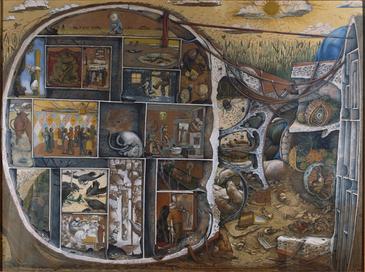I have been thinking a lot about User/Survivor research in the area of mental health in the past year and I feel that Maze is a very pertinent metaphor for it that reflects its complexity and impasses. A really interesting call for papers relating to User/Survivor research below…

One of the survivor academic researchers that have issued the call is Nev Jones from the USA. Nev came to England last summer and I met her. Brilliant thinker and a great woman. She has a blog called Ruminations on Madness which is brilliantly insightful (http://phenomenologyofmadness.wordpress.com). Nev is also a co-founder of The Lived Experience Research Network (LERN), an organisation that ‘promotes service user/survivor leadership and inclusion in behavioral health and disabilities research, advanced clinical practice, and program evaluation to advance inclusion and social justice.
LERN supports service user/survivor-identified students, researchers and evaluators, and is inclusive of those in academic, governmental, and community-based research/training settings. LERN advocates for increased accessibility in research and evaluation settings, social justice, and policy change, and aims to strengthen ties between stakeholders in the health and disabilities fields: community members, advocates, policy-makers, and researchers’ (from the organisation’s website http://www.lernetwork.org/).
Philosophy, Psychiatry & Psychology
Call for Papers: Critical Underpinnings of User/Survivor Research and Co-Production
Guest Editors: Jayasree Kalathil, PhD & Nev Jones, PhD(c)
Editorial Assistant: Clara Humpston, M.Sc.
Over the past several decades, user/survivor leadership in research as well as academic “co-production” (understood as a more robust form of academic co-leadership and shared decision making as opposed to nominal or tokenistic participatory methods) has gained strong traction in the areas of mental health services research, program evaluation, policy reform and, to a lesser extent, philosophy and cultural theory. In spite of these advances, the theoretical assumptions and implications involved in such projects remain largely underdeveloped and critically un-interrogated.
Likewise, critiques of user/survivor involvement and leadership rarely make their way into peer-reviewed publications, for the most part enduring in the space of informal conversations and behind-the-scenes decision-making. Certain areas of academic scholarship, including the medical humanities and philosophy of psychiatry and psychology, have similarly failed to consider the unique theoretical contributions scholars or others with lived experience might be in a position to make. Literary and philosophical analyses of others’ first person accounts, narratives or memoirs often exclude any discussion of the role or contribution of first person theory (broadly understood as the formal or informal interpretation and analysis of the sociopolitics, temporal dynamics, implications and/or rhetorical effects of first person narrative, story-telling or memoir).
The goal of the current call for papers is to solicit proposals aimed at tackling the ‘hard’ questions implicated in processes of user/survivor inclusion, exclusion and co-production. Proposals will be considered for inclusion in one or more special issues of the journalPhilosophy, Psychiatry and Psychology as well as a planned edited book tentatively targeted for Oxford University Press’ International Perspectives on Philosophy & Psychiatry series. We are soliciting proposals in English from a range of disciplines as well as from diverse positions and standpoints, including but not limited to individuals who identify as service users or survivors. We particularly encourage the submission of papers that critically appraise user/survivor research, leadership or co-produced work (again, both from peer and non-peer scholars and stakeholders).
Examples of topics of interest include (but are emphatically not limited to):
- critical explorations of the meaning and value of ‘expertise by experience’, particularly with respect to theoretical and philosophical work
- implications of the heterogeneity of service experiences, madness/disorder, temporal trajectories of distress and/or recovery, and identity
- political issues involved in the marginalization and othering of user/survivors with intersecting socio-political minority identities
- methodological and ethical considerations (including inter- and trans-disciplinarity, leadership in the humanities and basic and translational science vs. applied mental health services research
- interrogating key terms: user involvement, co-production, control, leadership, co-leadership
- ethical and methodological issues in relation to academic and theoretical engagement with personal narratives of madness/mental health (including autobiographies and memoirs)
- divisions between academia, community-based engagement, policy and organizational development, and activism
Proposal details:
We are asking for proposals including a title, five key words and a focused, 500-word abstract. The special issue editors will get back to potential authors within 6 weeks of the proposal deadline. Please note that all full submissions will be subject to blinded peer review.
Proposal deadline: 15 January 2014
Please email proposals to the Philosophy, Psychiatry & Psychology Special Issue editorial team ([email protected]) or contact Jayasree Kalathil or Nev Jones ([email protected]) with any questions.
